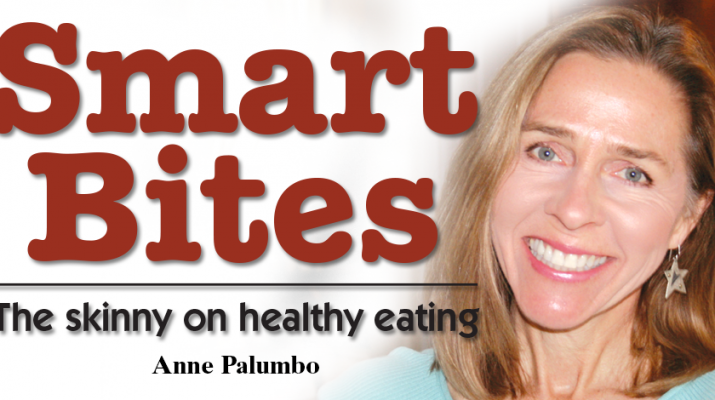What makes it so good for you
By Anne Palumbo
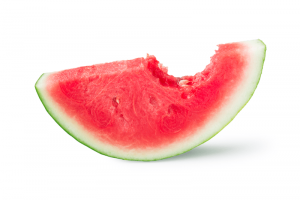 Although National Watermelon Day falls on Aug. 3, we’re featuring watermelon today because warm weather, picnics, the Fourth of July, and all things summery are but weeks away.
Although National Watermelon Day falls on Aug. 3, we’re featuring watermelon today because warm weather, picnics, the Fourth of July, and all things summery are but weeks away.
And what’s more summery than a cool, refreshing slice of watermelon?
Despite the popular belief that watermelon is just water and sugar, this delicious fruit is actually soaked with nutrients.
Each juicy bite has significant amounts of vitamins A and C, modest amounts of potassium and fiber and varying levels of many more vitamins, minerals and antioxidants.
Not so surprisingly, however, watermelon’s most abundant nutrient is water: 92%. An essential nutrient to overall good health, water does so much more than just quench our thirst. Even though it provides no calories or organic nutrients, our body uses water in all its cells, organs and tissues to help regulate its temperature and maintain other bodily functions. In addition, because we lose water through breathing, sweating, and digestion, it’s important to rehydrate by drinking fluids and eating foods — like watermelon — that brim with water.
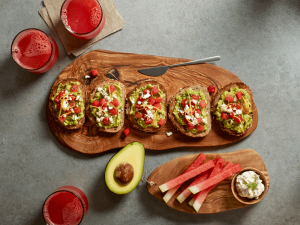
Water also helps our body remove waste through perspiration, urination and defecation. Ever experience unusually dark urine? Stools as hard as marbles? Most likely, you’re not getting enough water, which helps the kidneys, liver and intestines flush out waste. And while there is no evidence to prove that upping your fluid intake will cure constipation, consuming adequate water does help prevent constipation by keeping stools soft and moving things along at a steady clip.
Drinking fluids and eating foods like watermelon — during or after a meal — actually aids digestion. Water is needed in our mouth for saliva, which begins the digestive process, and further needed in our stomach to assist enzymes that help break down food so our body can absorb the nutrients. This all-important nutrient is also essential for digesting soluble fiber — the type of fiber that slows digestion and nutrient absorption.
So, whether we eat watermelon during or after a meal, we’re giving our digestive system a healthy boost!
But the claim-to-fame nutrient that has recently elevated watermelon to “super fruit” status — the nutrient that seems to be all over the news lately for its purported health perks — is lycopene, a plant-produced phytonutrient. A powerful antioxidant that gives watermelon its characteristic red hue, lycopene, like all phytonutrients, appears to be beneficial to human health and help prevent certain diseases. Furthermore, according to the Watermelon Board, watermelon contains more lycopene than any other fresh fruit or vegetable.
Why the limelight on lycopene? In a nutshell, current research indicates a strong association between high intake of lycopene-rich foods, such as watermelon, and reduced risk of certain cancers (most notably prostate cancer according to the National Cancer Institute), heart disease, chronic inflammation and stroke.
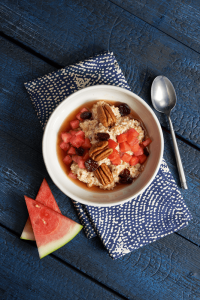
In a report just published in the journal “Neurology,” Finnish researchers suggested that lycopene, in addition to its ability to attack cancer-causing free radicals, may also reduce inflammation and cholesterol, improve immune function, and prevent blood from clotting. All of these benefits, they emphasized, may help reduce ischemic strokes, the most common kind, that are caused by blockages in blood flow to the brain.
Does eating a slice of watermelon a day keep sunburn at bay? Many studies say yes, thanks (again!) to its lycopene, which has been shown to offer some protection against UV-induced sunburn.
While scientists caution that the level of protection in no way replaces sunscreen, they do note that since most sun exposures occur during activities when our skin is totally unprotected — such as walking to and from our car — dietary factors with sun-protecting properties might have a considerable beneficial effect.
Watermelon’s antioxidant properties are further bolstered by impressive concentrations of two important vitamins: A and C. Both gobble up harmful free radicals associated with a host of age-related diseases and also boost the immune system’s defenses against infections and diseases. Individually, vitamin A is essential for growth and healthy vision, while vitamin C is a tissue-builder and wound-healer.
What’s more, this quintessential summer snack is a dieter’s dream food, delivering a mere 40 calories per diced cup. It’s filling, too, thanks to its high water content. Worried about cholesterol, fat or sodium? Watermelon happily scores a big goose egg in those departments.
Watermelon’s sweet flavor suggests it’s loaded with sugar and carbs. It’s not. As a comparison, a cup of watermelon has around 9 grams of sugar — about the same as a small fresh fruit, half banana or one cup of berries — and only 11 grams of carbs. Like other fruits, watermelon has a mix of carbohydrates: natural fruit sugar (fructose, a simple carb) and fiber (a different kind of carb).
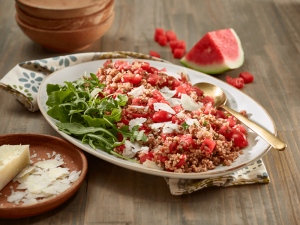
While refined foods, like many breads, pastries and sweets, also have simple carbs, their carbs are not healthy because they’ve been stripped of nearly all their fiber, vitamins and minerals. This “refinement” causes the carbs to be digested quickly and have a high glycemic index, which then leads to rapid spikes in blood sugar and insulin levels. Eating refined foods that are high on the glycemic index has been linked to drastically increased risk of many diseases, including obesity, heart disease, and Type 2 diabetes.
Watermelon has a high glycemic index, but because it’s low in carbs and boasts some fiber, it does not have the same affect on blood sugar, as, say, eating a doughnut. However, it’s still important for people with diabetes to be aware of the sugar and carb content of any fruit and to avoid eating excessive amounts of it. According to the American Diabetic Association, watermelon is safe for diabetics to eat in small amounts and is best eaten alongside foods that contain plenty of healthful fats, fiber, and protein.

